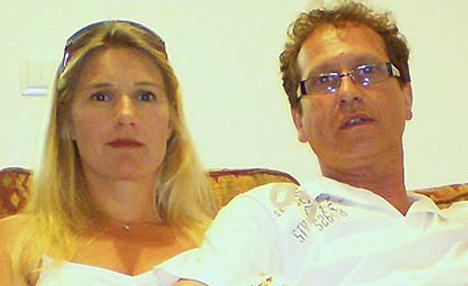
Solidarity as public officials and locals come out against Granada water transfer
RIO Muerto, Pueblo Muerto. Death of the river, death of the village. The sentiments of those who oppose a controversial water transfer project are clear.
For one hour on a hot August afternoon, 1,200 protestors, including local councillors and an MEP, gathered in the central square in Castril to demand central government stop its plans to pump 220 litres of water per second from a local river to Baza.
With banners and chants proclaiming the trasvase (water transfer) illegal and unnecessary, the feeling among those at the demonstration is that the scheme will eventually destroy the Castril Natural Park, one of Granada’s most important nature reserves.
Some opponents also reiterated fears that huge-scale construction plans will benefit from the scheme.
At a cost of more than 23 million euros, the government wants to install a network of pipes to carry water from the mouth of the Castril River as it enters the Portillo reservoir to Baza – 20 kilometres away.
This is to allay concerns of future drought in that area.
Many claim, however, a possible water shortage is an excuse to push the transfer through.
“The necessity for more drinking water for Baza is dubious. The people of Castril are against this plan and our voice should be heard,” said Arsenio Oliver, a councillor in Cortes de Baza – a municipality whose residents could lose land as the government starts expropriating to install the pipe infrastructure.
Willy Meyer, the Brussels representative for leftist group Izquierda Unida, was also in attendance as he confirmed the European Union will investigate the trasvase.
“This water is not going to be destined for human use. Rather it will have a different destiny. The European Parliament has stopped similar plans in the past and it will do again,” he told the protestors.
As reported in the Olive Press (issue 48), environmental group Ecologistas en Accion claims a proposed golf course scheme near Baza will be the greatest beneficiary of the water transfer.
In 2006 – the same year Madrid passed the scheme – a Danish company announced plans to build a 147-million-euro complex on the shores of the Negratin reservoir.
Plans for the 18-hole golf course were submitted to the regional government in March this year.
Meanwhile, the council leader of Castril has accused one of the main opponents of the trasvase of “harrasment” after blocking his construction plans.
Miguel Ortiz, who runs the Platform in Defence of the Castril River (PDCR), wanted to build a 30-home complex on protected land in the Castril Natural Park.
Mayor Juan Mar, who is asking the trasvase be delayed until a greater public consensus is reached, denied him permission.
And now, Mar claims he is the victim of a hate campaign and is asking the courts to intervene.
“I have been the victim of false denuncias (criminal reports) and defamation.”
Mar also accused Ortiz of using the water transfer to launch his personal attacks on the council leader.
Ortiz, who denies these claims, accused Mar of running “a dictatorship” in Castril. He also said the mayor allowed a personal friend to build a similar complex within the nature reserve.



I live in one of the small villages served by Castril. Very few of the villages in this area have irrigation or agricultural water. Consequently the drinking water is used for crops, which means that particularly through July & August there is hardly enough of a trickle of water for a shower in the extreme heat. If this water is sent to Baza, it means that there will be even less for the local population. Some days our water is cut off completely with no warning, and I know that some villagers have water for only 2 days per week and have to use storage tanks. Surely us locals should be provided for first, and then any ‘excess’ water could be sent off elsewhere. I am sure that behind this somewhere there is money involved!
I have followed with great personal and professional interest in how Spain is approaching its water shortage problems. The choices in vogue appear to be transvases (as highlighted in this story) and desalination. Not only are transvases (transbasin diversions) controversial because of perceptions about “stealing” water, but the diversions are also environmentally intrusive and highly expensive to build. Witness the recently canceled transvase from the Ebro River to Barcelona (at 180 million Euros).
Desalination is also very expensive and energy intensive. The plants produce greenhouse gases and brine, which is problematic to dispose of.
I am an atmospheric scientist who has led very recent research on cloud seeding. These studies were conducted by the U.S. government and lately by a private company in Istanbul, Turkey. Done scientifically and with the latest technology available, cloud seeding can help alleviate water shortages. The method has been practiced for over 50 years and is now pursued in over 40 countries. It has a cost far less than other strategies to increase precipitation, such as storing water underground, transvases, building new dams or desalination. Scientific studies have shown that environmental and health effects of cloud seeding are negligible.
The drought and water demand problems in Spain require a multi-faceted solution. Cloud seeding provides one more tool to alleviate these problems.